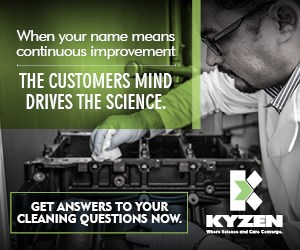How Artificial Intelligence Will Revolutionize Your Business
11 predictions of how AI and related technologies will revolutionize finishing in the next 10 years.

What is the greatest threat to small- to medium-sized finishing companies? Apathy around how artificial intelligence (AI) and smart technology will completely transform the world of manufacturing. Earlier this year we launched the TechEd Podcast (techedpodcast.com). Every week I interview a new guest who is disrupting the world of manufacturing and education. Guests have included the President and CEO of FANUC America, the Chairmen and CEOs of Rockwell Automation and Snap-on, the Executive Vice President of Haribo and others. All of them — to a company — have their eyes on AI and Industry 4.0 technologies as key disruptors in the world of manufacturing.
While Fortune 500 companies are obsessing over the unprecedented impact of this transformation, as I travel the U.S. I’m appalled at the number of small- to medium-sized manufacturers who tell me these advancements aren’t affecting them. In an effort to get their attention, allow me 11 predictions of how AI and related technologies will totally revolutionize finishing in the next 10 years.
- Autonomous trucks and vehicles will transport materials from suppliers to production lines to customers. Chemicals, materials and customer parts will arrive at the dock in driverless trucks and be transported to production lines by driverless automated guided vehicles.
- Using vision systems, robots will load and unload automated finishing technology equipment. Vision technology is advancing at an exponential rate and will soon make it possible for robots to load and unload almost any manufacturing process.
- Using AI technology, suppliers will know exactly what volume of materials to produce, inventory and ship. We will completely drive waste out of the supply chain as we will be able to precisely predict end-user demand in such a way that original equipment manufacturers (OEMs) will know exactly how much product to produce and what subassemblies, components and materials to order and when. As a result:
- The differentiator among chemical and materials suppliers will be who can best predict customer consumption and meet it in real time. Predicting customer demand and ensuring that the right amount of raw material is available at exactly the right time will enable suppliers of subassemblies, components and materials to decrease inventory to near zero, alleviating the risk of damage and obsolescence and freeing up cash.
- Your suppliers’ MRP systems will tell your MRP system that materials are on the way. Gone will be the days of production coordinators managing a sea of emails and phone calls intended to time production and capacity availability to due dates.
- Your finishing lines will schedule themselves. Artificially intelligent algorithms will optimize production schedules and product mix.
- Titrations, analysis and material additions will be completed automatically. No longer will chemists and technicians keep process variables in range by taking samples back to a lab to titrate and analyze them. These tasks will be completed in real time by smart sensors and process changes and additions will be completed automatically by smart devices.
- Quality defects will be driven to zero using in-process inspection and digital twins. Vision and other smart systems will identify quality defects in-process (no more final inspection). Alerts and corrective actions will take place in real time. Every manufacturing process will have its own digital twin, tied to the physical process using smart technology. The digital twin will get smarter and smarter over time. All process changes, additions and improvements will be tested and perfected on the digital twin before implementation on the physical process.
- The differentiator between finishers will be who uses AI and Industry 4.0 to minimize cost and thus price. The implementation of standardized quality in the 1990s created huge gaps between manufacturers who adopted its practices and those who did not. The same was true of kaizen and continuous improvement in the zeros. In the same way, manufacturers that implement AI and Industry 4.0 strategies will leave behind those that do not.
- As cost is driven down, closest to the customer wins. As AI and smart technology reduce the cost of manufacturing, transportation costs will become a disproportionately significant contributor to overall cost. Thus, lowering transportation costs by locating in close proximity to customers will create a competitive advantage.
- The differentiator between manufacturing equipment suppliers will be who can embed the right smart technology (sensors devices and analytics) in their systems. Manufacturing equipment producers already embed smart technology on their systems. Many robots and CNC machines already have onboard technology that can, as just one example, predict future failure and order replacement parts automatically. In the future, designing and integrating smart technology onto manufacturing equipment will become the standard, leaving behind those equipment providers that don’t do so.
The AI wave is already revolutionizing the world of manufacturing. Large manufacturing companies are already strategizing around this advancing technology. By and large, small and medium-sized businesses are not. They ignore the impact at their own peril.
Related Content
PCI Names 2023 Board of Directors, Executive Officers
The next individuals serving on PCI's board of directors and as executive officers have been selected.
Read MoreUnderstanding and Managing White Spots on Anodized Aluminum
Having trouble with spotting defects when anodizing? Taj Patel of Techevon LLC offers a helpful overview of the various causes of white spots and potential solutions.
Read MoreFinishing Another Year — Looking Back at the Trends of 2023
Products Finishing reflects on a year of reporting on the surface finishing industry and looks ahead to what may be in store for 2024.
Read MorePractical Environmental Management Reduces Costs, Refines Quality
By focusing on effluent treatment and efficient tin recovery, this Indian surface treatment plant meets stringent environmental standards and sustainable high-quality production.
Read MoreRead Next
A ‘Clean’ Agenda Offers Unique Presentations in Chicago
The 2024 Parts Cleaning Conference, co-located with the International Manufacturing Technology Show, includes presentations by several speakers who are new to the conference and topics that have not been covered in past editions of this event.
Read MoreDelivering Increased Benefits to Greenhouse Films
Baystar's Borstar technology is helping customers deliver better, more reliable production methods to greenhouse agriculture.
Read MoreEpisode 45: An Interview with Chandler Mancuso, MacDermid Envio Solutions
Chandler Mancuso, technical director with MacDermid Envio discusses updating your wastewater treatment system and implementing materials recycling solutions to increase efficiencies, control costs and reduce environmental impact.
Read More











.jpg;maxWidth=300;quality=90)







